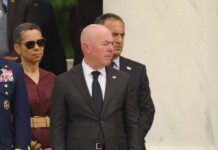
The U.S. government unveiled its vision for an international framework for military applications of artificial intelligence at a European conference last week.
The meeting took place in the Netherlands Wednesday and Thursday, and the State Department issued its guidance there. The “Political Declaration on Responsible Military Use of Artificial Intelligence and Autonomy” is meant to be an international pathway as AI continues to advance.
U.S. Promotes International Framework For ‘Responsible’ Military Use Of AI Technology https://t.co/ruCmJ0FsBK
— FIGHTERS FOR FREEDOM !!! (@TimothyCLatimer) February 19, 2023
The statement signed onto by over 60 countries, including the U.S. and China, is not legally binding and did not address many issues critics wanted. Questions over AI-guided drones and other worries were left unanswered.
However, proponents lauded the outcome of the first international military AI summit at The Hague.
A State Department spokesperson described the effort as a chance to “build an international consensus around how militaries can responsibly incorporate AI and autonomy into their operations.”
Further, the government said that this technology should be rolled out for defensive purposes and align with “respect for international law, security, and stability.”
AI has undergone major advancements in recent years, particularly with the explosion of OpenAI’s ChatGPT. This is an artificial intelligence program that is able to answer a wide variety of questions much more quickly than previous applications.
The program boasts 100 million active users only two months after launch, reaching that level faster than any consumer application in history. There is also Ukraine’s use of facial recognition technology in its war with Russia as well as AI-assisted targeting systems.
Among the measures called for by the U.S. declaration are to maintain human control over actions and decisions involving nuclear weapons.
Other provisions include keeping senior officials in charge of weapons systems that use AI, providing for clear documentation and purpose for AI, and building in safeguards in the event that the technology fails.
Interestingly, the statement urged countermeasures be enacted against “unintended bias in military AI capabilities.” There was no further explanation as to exactly what that “bias” may be.
A State Department official told Defense One that, while a NATO agreement was expected, the U.S. also wanted “buy-in” from Asia and Latin America. The goal is for all nations, instead of just U.S. allies, to agree to the stipulations.
Russia was excluded from the European conference and Ukraine did not attend. Israel was present but did not sign the statement. Experts note the U.S. military has been hesitant to sign onto such an agreement over worries that it could result in a competitive disadvantage.

































